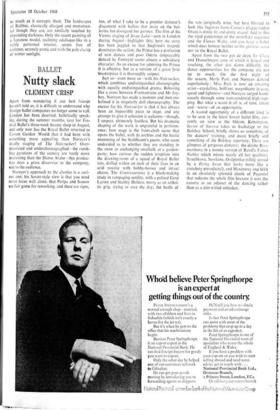Nutty slack
BALLET CLEMENT CRISP
Apart from wondering it our best friends haven't told us, it is difficult to understand why foreign ballet companies no longer come to call. London has been deserted, balletically speak- ing, during the summer months, save for Fes- tival Ballet's three-week beauty sleep in August, and only now has the Royal Ballet returned to Covent Garden Would that it had been with something more appealing than Nureyev's deadly staging of The Nutcracker! Over- decorated and underchoreographed—the rumb- ling gyrations of the scenery are vastly more interesting than the Danse Arabe—this produc- tion does a gross disservice to the company, and to the audience.
Nureyev's approach to the classics is a curi- ous one; his Soviet-style view is that you need never leave well alone, that Petipa and Ivanov are fair game for reworking, and there are signs, too, of what I take to be a premier danseur's discontent with ballets that insist on the bal- lerina but disregard her partner. The film of his Vienna staging of Swan Lake—seen in London during August—highlights this; here the story has been juggled so that Siegfried's tragedy dominates the action; the Prince has a profusion of new dances and poor Odette (impeccably danced by Fonteyn) seems almost a subsidiary character. As an excuse for admiring the Prince it is effective, but as a version of a great lyric tmasterpiece it is thoroughly suspect.
Just so—even more so—with his Nutcracker, which combines undistinguished choreography with equally undistinguished drama. Behaving like a cross between Frankenstein and Mr Joy- boy, Nureyev has made a monster and then em- balmed it in singularly dull choreography. The excuse for his Nutcracker is that it has always been an impossible piece to stage, and any attempt to give it cohesion is welcome—though, I suspect, ultimately fruitless. But his dramatic shaping of the work is ungrateful in perform- ance; how stagy is the front-cloth scene that opens the ballet, with its urchins and the hectic mumming of the Stahlbaum's guests, who seem undecided as to whether they are standing in the snow or exchanging smalltalk at a garden- party; how curious the sudden irruption into the drawing-room of a squad of Royal Ballet tots, drilled within an inch of their lives in an arid routine with hobby-horses and infant charm. The Grossi,atertanz is a blush-making study in rampaging senility, with a palsied Gerd Larsen and Stanley Holden, merry as an arthri- tic grig, trying to save the day; the battle of
the rats (originally mice, but here bloated to look like fugitives from Camus's plague-ridden Oran) is dimly lit and dimly staged. Add to this the rigid patternings of the snowflake sequence and the Flower Waltz. and you have a ballet which does honour neither to the glorious score nor to the Royal Ballet.
Apart from the two pas de deux for Clara and Drosselmeyer (one of which is lyrical and touching, the other just damn difficult), the dance opportunities for the company are not up to much. On the first night of the season, Merle Park and Nureyev danced superlatively : Miss Park is now an amazing artist—crystalline, brilliant, magnificent in ease, speed and lightness—and Nureyev surged hand- somely through some transcendental high-step- ping. But what a waste it all is. of time, talent and—worse--of an opportunity.
A wasted opportunity of a different kind is to be seen in the latest Soviet ballet film, cur- rently on view at the Odeon, Kensington. Secret of Success takes us backstage to the Bolshoy School, briefly shows us something of the dancers' training, and more briefly still something of the Bolshoy repertory. There are glimpses of gorgeous dancers: the divine Bess- mertnova in a moony version of Ravel's liaises Nobles which misses nearly all her qualities; Struchkova, Sorokina, Ossipienko (vilely served by a Dying Swan that looks more like a crotchety pterodactyl), and Maximova and Sekh in an absolutely splendid chunk of Paganini that redeems the whole film because it uses the camera as an adjunct of the dancing rather than as a dim-witted onlooker.






































 Previous page
Previous page